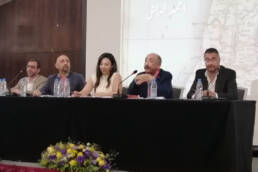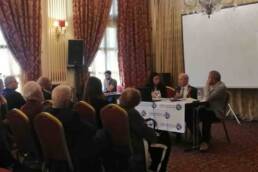After more than three years of online webinars due to the Corona pandemic, the Center for Arab Unity Studies organized a seminar on Arab Media Freedom Between Polarization and Reconciliation, on Saturday November 5, 2022, in Beirut. And since the seminar coincided with the US midterm elections, the discussions touched on the issue of these elections due to the impact of US decision-makers on the Arab region. The keynote speaker at the seminar was the Egyptian journalist Hafez Al-Marazi, in the presence and participation of a group of researchers, media professionals, and interested attendees in media affairs. Director General of the Center, Luna Abuswerh, presented the seminar, and was moderated by Coordinator of the Thinking and Policy Analysis Unit at the Center Muhammad Ballout.
Al-Marazi considered, discussing the issue of polarization and media freedoms in our Arab world, that media freedom is misunderstood, thus restricted to presenting the two opposite points of view, and journalist’s refrain from practicing politics. Al-Marazi also considered that “Digital communication platforms cannot be a substitute for traditional media, but merely contribute to weakening monopolism.”
The issue of the American elections received great attention at the seminar. Al-Marazi regarded that the United States was on the verge of a crisis due to fears that the Republican team would reject the results, which is reflected in US President Joe Badin’s recent statements about “the danger of fascism and concern for the future of democracy and the circulation of power in the United States.” In the same context, Al-Marazi touched on the polarization in both traditional and digital American media, explaining that the media is after all a reflection of the political situation and the division within the American society.
The interventions of some of the attendees focused on the mechanisms of media work that were mainly defined by the West, and thus the confusion of concepts that sponsor this work. They also discussed social media that was able to weaken the traditional media, in light of the “crisis of trust” raging in the media in general, which is often extreme to one of the two contradictory points of view without taking into account the “gray” points of view.
The interventions also stressed the polarization prevailing in the Arab media in particular, and the rejection of the other opinion, in addition to the heavy reliance on foreign news sources.
مركز دراسات الوحدة العربية
فكرة تأسيس مركز للدراسات من جانب نخبة واسعة من المثقفين العرب في سبعينيات القرن الماضي كمشروع فكري وبحثي متخصص في قضايا الوحدة العربية
We appreciate your support
SUPPORT THE CENTRE FOR ARAB UNITY STUDIES
The Centre is reaching out for its friends and readers for support, whether by ordering our publications and paying for them in hard currency, or through donations. The Centre welcomes any support to boost its resiliency, to ensure its survival, the continuation of its legacy and its commitment to tackle issues facing the Arabs and the Arab world.



